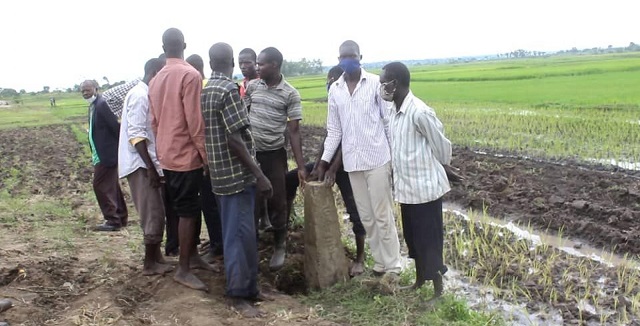
Butebo, Uganda | THE INDEPENDENT | Rice farmers along the Komorototo wetland in Butebo district have unanimously agreed to vacate the wetland with an appeal to the government not to harshly evict them.
The farmers said that through rice growing, they have been able to educate their children and provide basic needs for their families and when they are forced out, they will be left with no option for their survival.
Ibrahim Okurut, a farmer and resident of Akoboi village in Butebo sub-county said the government should give them a grace period of two years to cultivate rice that will enable them to service their bank loans.
He said the majority of farmers lost bumper harvest in the first season due to changes in weather patterns.
Margret Asio, another farmer said the government should prioritize giving them viable alternative livelihood projects to enable them to cope up with the adverse effects of the COVID-19 pandemic. Other farmers requested the government to provide them with capital to begin small businesses on top of compensation.
The farmers made these remarks on Thursday while witnessing the launch of the demarcation exercise by the ministry of water and environment. The exercise which went on smoothly amidst heavy security deployment especially of anti-riot police ends today.
Micheal Nantulya, the district vice chairperson while witnessing the demarcation exercise, appealed to residents not to remove the mark stones saying the district is already experiencing adverse weather changes.
“My people we have already started experiencing adverse weather changes and it will be bad if you come and uproot these mark stones, let’s leave them here for our own good” he said.
Deo Kabaalu, senior wetlands officer eastern region, at the ministry of water and environment said the threat being imposed by human activities especially rice farming on the wetland has forced them to demarcate its boundaries. He explained that the demarcation exercise which is ongoing involves retracing wetland boundaries and placing of mark stones basing on three parameters such as water, vegetation and soil.
The project covers 12 districts of Butebo, Pallisa, Ngora, Tororo, Butaleja, Namutumba, Kaliro, Kibuku, Budaka, Bukedea, Kumi and Mbale. He said farmers who have been depending on the wetland will be registered at their respective sub counties for them to benefit from government projects.
Information available indicates that at least 75 percent of the wetlands have been encroached on and degraded by human activity.
Micheal Okurut, the district chairperson requested the government to come up with alternative sources of livelihood for farmers who have mainly been depending on the swamp since time memorial. He said as leaders, they will embark on mindset change and sensitization of communities to appreciate government projects.
*****
URN
 The Independent Uganda: You get the Truth we Pay the Price
The Independent Uganda: You get the Truth we Pay the Price





